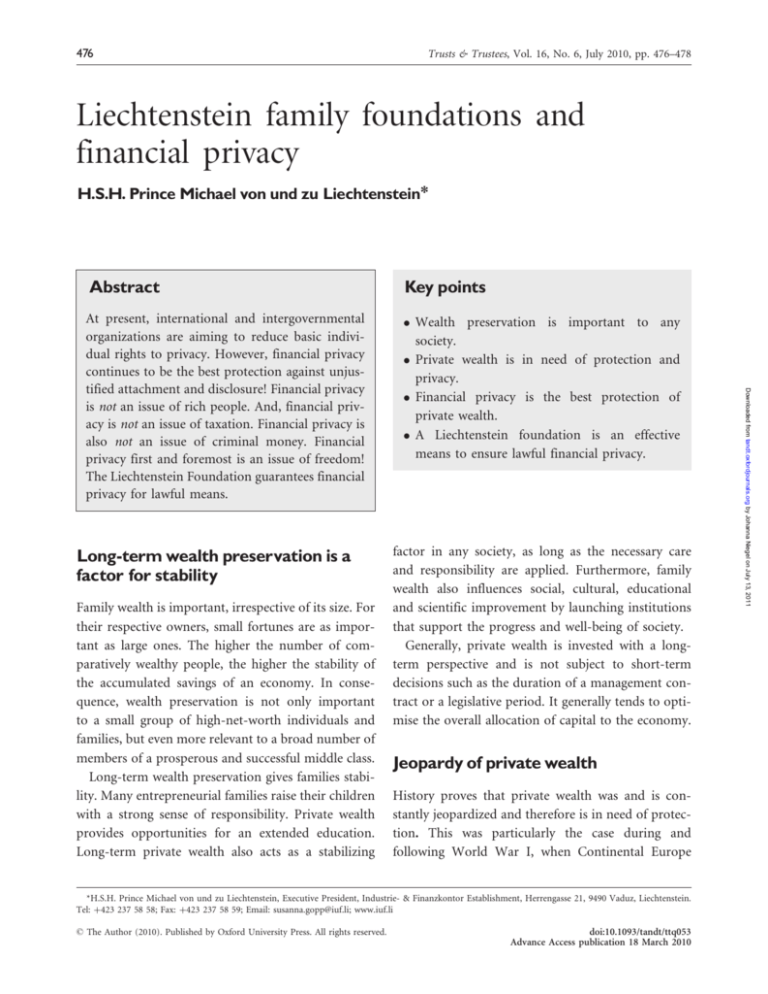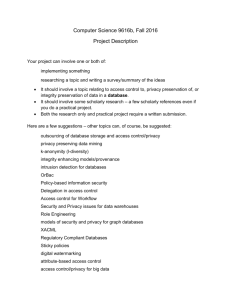
476
Trusts & Trustees, Vol. 16, No. 6, July 2010, pp. 476–478
Liechtenstein family foundations and
financial privacy
H.S.H. Prince Michael von und zu Liechtenstein*
Key points
At present, international and intergovernmental
organizations are aiming to reduce basic individual rights to privacy. However, financial privacy
continues to be the best protection against unjustified attachment and disclosure! Financial privacy
is not an issue of rich people. And, financial privacy is not an issue of taxation. Financial privacy is
also not an issue of criminal money. Financial
privacy first and foremost is an issue of freedom!
The Liechtenstein Foundation guarantees financial
privacy for lawful means.
Wealth preservation is important to any
society.
Private wealth is in need of protection and
privacy.
Financial privacy is the best protection of
private wealth.
A Liechtenstein foundation is an effective
means to ensure lawful financial privacy.
Long-term wealth preservation is a
factor for stability
Family wealth is important, irrespective of its size. For
their respective owners, small fortunes are as important as large ones. The higher the number of comparatively wealthy people, the higher the stability of
the accumulated savings of an economy. In consequence, wealth preservation is not only important
to a small group of high-net-worth individuals and
families, but even more relevant to a broad number of
members of a prosperous and successful middle class.
Long-term wealth preservation gives families stability. Many entrepreneurial families raise their children
with a strong sense of responsibility. Private wealth
provides opportunities for an extended education.
Long-term private wealth also acts as a stabilizing
factor in any society, as long as the necessary care
and responsibility are applied. Furthermore, family
wealth also influences social, cultural, educational
and scientific improvement by launching institutions
that support the progress and well-being of society.
Generally, private wealth is invested with a longterm perspective and is not subject to short-term
decisions such as the duration of a management contract or a legislative period. It generally tends to optimise the overall allocation of capital to the economy.
Jeopardy of private wealth
History proves that private wealth was and is constantly jeopardized and therefore is in need of protection. This was particularly the case during and
following World War I, when Continental Europe
*H.S.H. Prince Michael von und zu Liechtenstein, Executive President, Industrie- & Finanzkontor Establishment, Herrengasse 21, 9490 Vaduz, Liechtenstein.
Tel: þ423 237 58 58; Fax: þ423 237 58 59; Email: susanna.gopp@iuf.li; www.iuf.li
ß The Author (2010). Published by Oxford University Press. All rights reserved.
doi:10.1093/tandt/ttq053
Advance Access publication 18 March 2010
Downloaded from tandt.oxfordjournals.org by Johanna Niegel on July 13, 2011
Abstract
Trusts & Trustees, Vol. 16, No. 6, July 2010
was in extraordinary turmoil. Again today, serious
politicians—even from various Western democracies—are using the populist term: ‘The rich should
pay!’, aiming to provoke envy.
History proves that private wealth was and is
constantlyjeopardized and therefore is in need
of protection.
Lawful wealth protection through a
Liechtenstein Foundation
Liechtenstein has a very modern law on foundations that clearly distinguishes between family
foundations, charitable foundations, mixed purpose
foundations and private special-purpose foundations,
etc.
As an example, the main objectives of a
Liechtenstein family foundation are:
Succession planning.
Control of family businesses.
Avoidance of problems due to spoiling effects,
divorces, extravagance, etc.
Asset protection against unjustified attachment.
Securing wealth over generations.
Implementation of specific intentions, such as
protection of a family’s art collection, a family’s
tradition, support of disadvantaged family members, etc.
Tax planning in certain jurisdictions.
In addition, Liechtenstein foundations can be structured in a discretionary way, meaning that the foundation assets are separated from a family for the
477
benefit of a class of beneficiaries but with the effect
that only at the time a beneficiary receives distributions out of the foundation, such funds will be relevant to taxation.
Furthermore, Foundation Governance is a core part
of the new Liechtenstein Foundation Law (introduced
in April 2009) and ensures that the founder’s intentions, as well as the beneficiaries’ interests, are at all
times applied. In particular, the Liechtenstein law
makes specific governance provisions for the charitable foundation which is perfectly suited to cater for
philanthropic purposes of a family.
From all of the above, we can see that a foundation
is not only important to the preservation of long-term
family wealth but also an effective means to ensure
financial privacy. A foundation achieves legal personality and once a founder has endowed assets to the
foundation such assets do only belong to the foundation. The foundation is represented by the foundation
council who administers the assets in accordance with
the foundation’s purpose. A foundation guarantees
financial privacy, examples of which can be seen
below. It must be stressed that a foundation does
not provide financial privacy in any cases of unlawful
purposes such as money-laundering, terrorism financing, human trafficking, etc.
This fundamental value of lawful financial privacy
hence should be maintained at all costs since it brings
crucial advantages to individuals, families, society and
the economy.
The essence of financial privacy
Privacy, in general, is a human right. Financial privacy
such as the protection of lawful financial data,
investments, income, spending, is a specific field of
privacy to which everybody should be entitled to,
irrespective of the size of assets or revenue. There is
no justification for third parties being entitled to disclose information regarding lawfully acquired assets.
Exceptions should only be justified by claims (for
instance by creditors) or in situation of conflict of
interest. Financial privacy is the best protection
against personal attacks like theft, robbery,
Downloaded from tandt.oxfordjournals.org by Johanna Niegel on July 13, 2011
In 1926, as a result of this financial turmoil, the
Liechtenstein Private Foundation was created as a
tool to protect family assets and as a comparable
civil law instrument to the long-standing common
law trust. This was the start of the success of
the Liechtenstein Foundation, which continues
in our days as a means of lawful private wealth
protection.
Jurisdiction-specific articles
478
Jurisdiction-specific articles
kidnapping or unjustified attachment. Financial privacy also protects against inflated expectations of heirs
and ‘gold diggers’ or against spoiling, etc.
Privacy, in general, is a human right. Financial
privacy . . .is a specific field of privacy to
which everybody should be entitled to.
Reducing the Liechtenstein Foundation to a
vehicle used for the exclusive purpose of hiding
money from fiscal authorities does not do the
foundation justice. In fact, the Liechtenstein
Foundation has a great tradition in providing
essential financial privacy for absolutely lawful
purposes.
In former times, people protected their valuables
against unjustified attacks by burying them in the
forest or by hiding them under the mattress. Today
financial privacy has taken over this protection and
hence is one of the most effective means for asset
protection.
In former times, people protected their valuables against unjustified attacks by burying
them in the forest or by hiding them under the
mattress.
Liechtenstein advocates for financial
privacy while committing to
international standards
After many decades of successfully applying the foundation for lawful wealth protection purposes,
Liechtenstein disposes of the infrastructure, experience and know-how to manage complex structures.
Furthermore, Liechtenstein has a stable political and
economic environment, an excellent financial system
and a legislation that is internationally recognized as
achieving a high standard.
For many years, Liechtenstein financial intermediaries have been subject to strict Due Diligence Rules.
They are supervised by the Financial Market
Authority which also issues the license to exercise
the profession as a trustee. This license is issued
only to persons who have acquired the necessary
expertise over several years of qualified practice and
who have successfully passed the examination stipulated by law. Liechtenstein is extremely careful not to
provide shelter for illegal funds. Gate-keeping is
taken very seriously. Since the implementation of
the 1st EU-Anti-Money-Laundering-Directive in
1995, all further directives have successfully been
implemented.
The Liechtenstein Foundation provides a high level
of discretion for persons and families with lawfully
acquired assets who require privacy as a basic necessity for the protection of their wealth.
Downloaded from tandt.oxfordjournals.org by Johanna Niegel on July 13, 2011
Privacy supports personal freedom. Voyeurism—
regardless of whether it stems from social circles,
the broad public, the media or the administration—
is detrimental both to personal and financial freedom.
The wish, now being strongly expressed by certain
international and intergovernmental organizations,
to register beneficiaries of private foundations and
trusts worldwide does not contribute to fighting
money-laundering. Its only effect is to foment unjustified political curiosity and sensationalism, and
incites attacks on assets and people.
The growing political wish for total transparency
neglects the value of financial privacy.
Reducing the Liechtenstein Foundation to a vehicle
used for the exclusive purpose of hiding money from
fiscal authorities does not do the foundation justice.
In fact, the Liechtenstein Foundation has a great tradition in providing essential financial privacy for
absolutely lawful purposes. In contrast, exaggerated
information exchange is dangerous as there is justified
doubt in the reliability of data protection by public
institutions as well as of the proper use of information
in the various foreign jurisdictions.
Trusts & Trustees, Vol. 16, No. 6, July 2010







